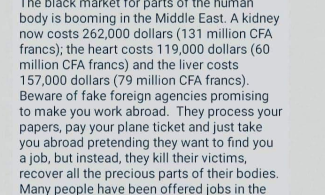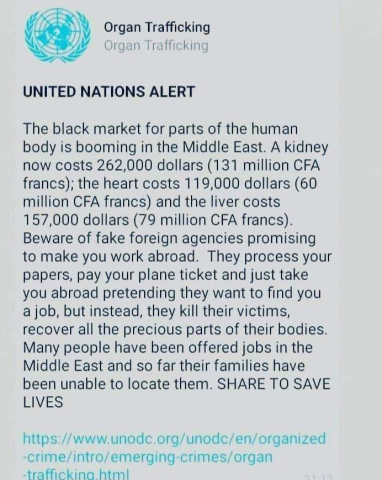
Verdict: No, this alert didn't originate from the UNODC; it's only mimicry of another publication on the department's website.
Claim: A photo making the rounds on the social media shows an organ trafficking alert purportedly issued by the United Nations’ Office on Drugs and Crime department (UNODC) urging readers to beware of agents/companies offering them jobs abroad.
Verdict: No, this alert didn't originate from the UNODC; it's only mimicry of another publication on the department's website.
Full Story
Organ trafficking, under the broader spectrum of human trafficking and migrant smuggling, has remained a huge problem the United Nations, other international bodies and governments of various countries seek to tackle.
The United Nations Human Rights Office of the High Commissioner Protocol to Prevent, Suppress and Punish Trafficking in Persons Especially Women and Children, provides the sole internationally accepted definition of trafficking in persons.
Article 3(a) of the protocol stipulates that “Trafficking in Persons shall mean the recruitment, transportation, transfer, harbouring or receipt of persons, by means of the threat or use of force or other forms of coercion, of abduction, of fraud, of deception, of the abuse of power or of a position of vulnerability or of the giving or receiving of payments or benefits to achieve the consent of a person having control over another person, for the purpose of exploitation.
“Exploitation shall include at a minimum the exploitation of the prostitution of others or other forms of sexual exploitation, forced labour or services, slavery or practices similar to slavery, servitude or the removal of human organs.”
It has been identified that migrants seeking greener pastures in other countries but do not have the option to migrate legally form the majority of those who fall victim to these organ harvesters. “Some victims are tricked or coerced into having their organs removed,” UNODC says.
Several programmes have been organised to curb the spread of this menace by educating the people on the need for a legal migration process. These programmes are handled by organizations such as the International Organization for Migration among others.
Trafficking in persons for the purpose of organ removal is not a new phenomenon. Over the years, the crime has received significant attention from media, NGOs, academia and also from international and regional actors.
These include the Special Rapporteur on trafficking in persons, especially in women and children, Special Representative and Co-ordinator for Combating Trafficking in Human Being and Organisation for Security and Co-operation in Europe.
Also, in 2013, the UN Economic and Social Council and the General Assembly adopted resolutions that inter alia request UNODC to collect and analyse information on trafficking in persons for organ removal and encourage Member States to provide to UNODC evidence-based data on patterns, forms and flows of trafficking in persons, including for the purpose of the removal of organs respectively.
It has, however, remained a persistent problem, hence the focus.
The international (transplant) community has developed standards and guidelines to govern transplantation, to regulate care for donors and thereby prevent organ-related crimes, including trafficking in persons for the purpose of organ removal. Of particular relevance are the WHO Guiding Principles on Human Cell, Tissue and Organ Transplantation, as well as the Declaration of Istanbul on Organ Trafficking and Transplant Tourism.
Particularly in Nigeria, the establishment of the National Agency for the Prohibition of Trafficking in Persons (NAPTIP) on 14 July 2013 shows a concerted effort to put a stop to trafficking and consequently organ trafficking.
The photo (pictured below) has been circulated on social media as an organ trafficking alert from the UNODC establishing the fact that there is a black market for human body parts.

The alert highlighted the most valuable organs and listed the cost of each one in dollars.
According to the alert, a kidney is said to cost $262,000 (N107,813,000); a heart goes for $119,000 (N48,968,500) and a liver $157,000 (N64,605,500).
This had been shared on some websites and across social media platforms.
According to a global report from 2020, while still detected in small numbers, trafficking for the purpose of organ removal was reported in North Africa, South and South-East Asia, Central America and Europe during the reporting period. It indicated that in 2017, about 25 victims were reported, and in 2018, this number had risen to more than 40.
Meanwhile, females were most of the victims trafficked for sexual exploitation, and two-thirds of the victims were trafficked for forced labour. Most of the men were trafficked for organ removal.
Verification
A link on the alert was entered and it brought out an error result. It is, however, observed that it is mimicry of an archived link from UNODC.
While the comments on the photo highlighted the prices of human organs in the black market noting that it is on the rise in the Middle East, the archived link from the UNODC states that desperate situations of recipients and donors of human organs create an avenue for exploitation by international organ trafficking syndicated.
It also stated that victims of these crimes could be vulnerable by virtue of poverty.
Dubawa also observed that the alert has previously been flagged by the AFP fact-check which stated that UNODC Pakistan had confirmed that the purported alert is fake.
AFP quoted the regional branch of the UNODC as saying that the message "does not originate from UNODC and contains out-of-date information that is not related to current UNODC activities”.
Conclusion
The photo did not originate from the United Nations as the body is yet to give a warning about a black market for human organs in the Middle East. Although there are efforts to curb the menace of organ trafficking by the organization, the Middle East was not one of the continents highlighted in past reports regarding this. Also, the UNODC is yet to give a cost for each vital human part.
The researcher produced this fact-check per the Dubawa 2021 Kwame KariKari fellowship in partnership with SaharaReporters to facilitate the ethos of “truth” in journalism and enhance media literacy in the country.